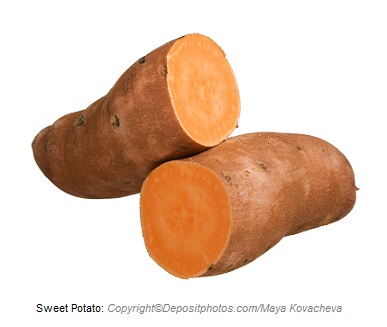Sweet potato is a root vegetable from Convolvulaceae family and does not  belong to nightshade family (baking potatoes, peppers, tomatoes, and eggplant). Also known as kumara, sweet potato is considered the same as yam by some people. Botanically, sweet potatoes differ from baking potatoes, as they have different phytonutrients. Sweet potatoes do not produce “solanine”, an alkaloid that worsens inflammation.
belong to nightshade family (baking potatoes, peppers, tomatoes, and eggplant). Also known as kumara, sweet potato is considered the same as yam by some people. Botanically, sweet potatoes differ from baking potatoes, as they have different phytonutrients. Sweet potatoes do not produce “solanine”, an alkaloid that worsens inflammation.
Sweet potatoes, baking potatoes and yams are different from each other in terms of the storage proteins. The storage proteins in sweet potatoes, baking potatoes, and yams are sporamins, patatins and dioscorins, respectively.
A medium sweet potato weighs about 115 grams and contains 24 grams of carbohydrates, 4 grams of fiber, and 2 grams of protein.
Average calories: 104 per one medium.
|
Sweet potato: one medium |
|
|
Carbohydrate |
24 |
|
Fiber |
4 |
|
Protein |
2 |
|
Fat |
0 |
|
Calories |
104 |
Vitamins found in higher amounts: vitamins A, C, B6, B5, B2 and B3. A medium sweet potato has about 21900 IU of vitamin A. One cup of sweet potato has more vitamin A than one cup of carrots, 38440 IU versus 21500 IU.
Minerals found in higher amounts: manganese, potassium, phosphorus, copper, magnesium and calcium. A medium sweet potato has approximately 600 mg of potassium.
Phytonutrients found in higher amounts and their health benefits: the phytochemicals present in sweet potatoes are carotenoids (beta-carotene and zeta-carotene), anthocyanins, pectin, betaine, squalene, phytoene and isoquercetin.
Carotenoids are powerful antioxidants essential for optimal health of the eyes and demonstrate anti-cancer activities as well.
Anthocyanins are flavonoids that scavenge free radicals, fight cancers, reduce inflammation and boost the immune system. Peonidin is a unique anthocyanin in sweet potatoes. Other sources of peonidin are cranberries, blueberries, cherries, plums and red grapes.
Squalene is a triterpene phytochemical that acts as a precursor for steroid hormones and is used as a skin moisturizer in cosmetics and as an adjuvant in vaccines. It is found in summer squash, olives, wheat germ, amaranth, and rice bran as well.
Found also in beets and spinach, betaine is a chemical compound in sweet potato. A medium sweet potato contains about 40 mg of betaine. It functions along with vitamins B12, B9 and B6 to lower homocysteine level. Homocysteine increases risk of cardiovascular diseases. Betaine may have a protective effect against deposition of fats in the liver (fatty liver).
Phytoene is a type of carotenoid, which is found in tomatoes as well. It reduces the risk of developing prostate cancer and also accumulates in the skin, absorbing ultraviolet light from sun and showing anti-oxidative and anti-inflammatory properties.
Isoquercetin is also found in mangoes and rhubarbs. It is a flavonoid that demonstrates anti-inflammatory and anti-cancer activities.
Because of lower glycemic index (GI), sweet potatoes could be consumed by people with diabetes to adjust their blood sugar levels.

